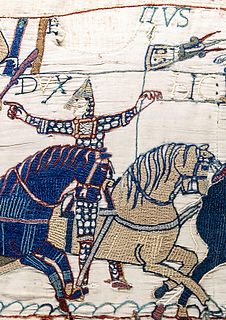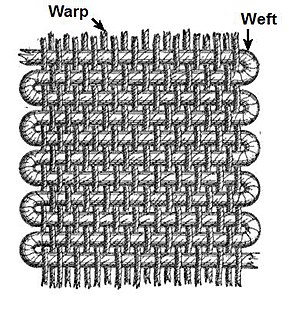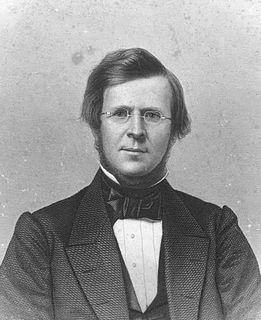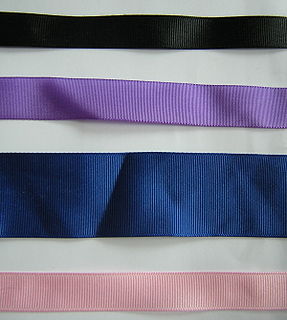Related Research Articles

Embroidery is the craft of decorating fabric or other materials using a needle to apply thread or yarn. Embroidery may also incorporate other materials such as pearls, beads, quills, and sequins. In modern days, embroidery is usually seen on caps, hats, coats, overlays, blankets, dress shirts, denim, dresses, stockings, and golf shirts. Embroidery is available in a wide variety of thread or yarn colour.

Weaving is a method of textile production in which two distinct sets of yarns or threads are interlaced at right angles to form a fabric or cloth. Other methods are knitting, crocheting, felting, and braiding or plaiting. The longitudinal threads are called the warp and the lateral threads are the weft, woof, or filling. The method in which these threads are inter-woven affects the characteristics of the cloth. Cloth is usually woven on a loom, a device that holds the warp threads in place while filling threads are woven through them. A fabric band that meets this definition of cloth can also be made using other methods, including tablet weaving, back strap loom, or other techniques that can be done without looms.

Manchester is a town in Hartford County, Connecticut, United States. As of the 2020 census, the town had a total population of 59,713. The urban center of the town is the Manchester census-designated place, with a population of 36,379 at the 2020 census. The town is named after Manchester, in England.
Needlepoint is a type of canvas work, a form of counted thread embroidery in which yarn is stitched through a stiff open weave canvas. Traditionally needlepoint designs completely cover the canvas. Although needlepoint may be worked in a variety of stitches, many needlepoint designs use only a simple tent stitch and rely upon color changes in the yarn to construct the pattern. Needlepoint is the oldest form of canvas work.

Trinity College is a private liberal arts college in Hartford, Connecticut. Founded as Washington College in 1823, it is the second-oldest college in the state of Connecticut.

Oren Burbank Cheney was an American politician, minister, and statesman who was a key figure in the abolitionist movement in the United States during the later 19th century. Along with textile tycoon Benjamin Bates, he founded the first coeducational university in New England which is widely considered his magnum opus. Cheney is one of the most extensively covered subjects of Neoabolitionism, for his public denouncement of slavery, involuntary servitude, and advocation for fair and equal representation, egalitarianism, and personal sovereignty.

Bexley Hall was an Episcopal seminary from 1824 until April 27, 2013, when it federated with Seabury-Western Theological Seminary as Bexley Hall Seabury-Western Theological Seminary Federation, also known as Bexley Seabury. For three years, Bexley Seabury seminary operated from two locations—in Bexley, Ohio, a suburb of Columbus, and in Chicago, Illinois —until July 2016 when it consolidated at a single campus location at Chicago Theological Seminary in Chicago's Hyde Park/Woodlawn district. Bexley Seabury is one of 10 official seminaries of the Episcopal Church in the United States of America. Bexley Seabury's mission includes, "creating new networks of Christian formation, entrepreneurial leadership and bold inquiry in the service of the Gospel".

Cobb Divinity School, founded in 1840, was a Free Will Baptist graduate school affiliated with several Free Baptist institutions throughout its history. Cobb was part of Bates College in Lewiston, Maine, United States from 1870 until 1908 when it merged with the college's Religion Department.

Yale Divinity School (YDS) is one of the twelve graduate and professional schools of Yale University in New Haven, Connecticut.

George Colby Chase was an American intellectual and professor of English who served as the second President of Bates College succeeding its founder, Oren Burbank Cheney, from March 1894 to November 1919.

The study of the history of clothing and textiles traces the development, use, and availability of clothing and textiles over human history. Clothing and textiles reflect the materials and technologies available in different civilizations at different times. The variety and distribution of clothing and textiles within a society reveal social customs and culture.

The dress of the Armenians, also known as Armenian traditional clothing, reflects a rich cultural tradition. Wool and fur were utilized by the Armenians along with the cotton that was grown in the fertile valleys. During the Urartian period, silk imported from China was used by royalty. Later, the Armenians cultivated silkworms and produced their own silk.
Kate Cheney Chappell is an American businesswoman, artist, and manufacturer. She co-founded personal-care product manufacturer Tom's of Maine in 1970 as well as wool clothing manufacturer Ramblers Way in 2010 with her husband Tom Chappell.

Grosgrain is a type of fabric or ribbon defined by the fact that its weft is heavier than its warp, creating prominent transverse ribs. Grosgrain is a plain weave corded fabric, with heavier cords than poplin but lighter than faille, and is known for being a firm, close-woven, fine-corded fabric. Grosgrain has a dull appearance, with little luster in comparison to many fabric weaves, such as satin, often used for ribbons; however, it is comparatively very strong. Grosgrain fabric is most commonly available in black, but grosgrain ribbon comes in a large variety of colors and patterns. The ribbon is very similar to Petersham ribbon in its appearance, but it does not have the ability to follow the curves of a surface or edge the way that the latter does.
Andover Newton Theological School (ANTS) was a graduate school and seminary in Newton, Massachusetts. Affiliated with the American Baptist Churches USA and the United Church of Christ, it was an official open and affirming seminary, meaning that it was open to students of same-sex or transgender orientation and generally advocated for tolerance of it in church and society.

John Williams was the eleventh presiding bishop of the Protestant Episcopal Church in the United States of America.
Cheney, originally de Cheney, is a toponymic surname of Old French origin, introduced into England by the Normans.

English embroidery includes embroidery worked in England or by English people abroad from Anglo-Saxon times to the present day. The oldest surviving English embroideries include items from the early 10th century preserved in Durham Cathedral and the 11th century Bayeux Tapestry, if it was worked in England. The professional workshops of Medieval England created rich embroidery in metal thread and silk for ecclesiastical and secular uses. This style was called Opus Anglicanum or "English work", and was famous throughout Europe.

William Woodruff Niles was the third bishop of the Episcopal Diocese of New Hampshire and served as such from 1870 until his death in 1914.

The history of Bates College began shortly before Bates College's founding on March 16, 1855, in Lewiston, Maine. The college was founded by Oren Burbank Cheney and Benjamin Bates. Originating as a Free Will Baptist institution, it has since secularized and established a liberal arts curriculum. After the mysterious 1853 burning of Parsonsfield Seminary, Cheney wanted to create another seminary in a more central part of Maine: Lewiston, a then-booming industrial economy. He met with religious and political leaders in Topsham, to discuss the formation of such a school, recruiting much of the college's first trustees, most notably Ebenezer Knowlton. After a well-received speech by Cheney, the group successfully petitioned the Maine State Legislature to establish the Maine State Seminary. At its founding it was the first coeducational college in New England. Soon after it was established, donors stepped forward to finance the seminary, developing the school in an affluent residential district of Lewiston. The college struggled to finance its operations after the financial crisis of 1857, requiring extra capital to remain afloat. Cheney's political activities attracted Benjamin Bates, who was interested in fostering his business interests in Maine. Bates donated installments of tens of thousands of dollars to the college to bring it out of the crisis.
References
- ↑ Tsetsi, Kristen J. (February 18, 2013). "Fabric of their lives". Journal Inquirer . Retrieved March 15, 2020.
- ↑ "List Detail | Moses Brown School". www.mosesbrown.org. Archived from the original on June 27, 2015.
- ↑ Reidy, Chris (March 22, 2006). Colgate will buy Tom's of Maine. Boston Globe
- ↑ Colby College website. Retrieved June 17, 2013.
- ↑ Tsetsi, Kristen J. (February 18, 2013). "Fabric of their lives". Journal Inquirer . Retrieved January 6, 2020.
- ↑ Gentile, Annie (June 21, 2018). "Art Gallery Dedicated At Cheney Homestead". Hartford Courant . Archived from the original on January 8, 2020. Retrieved January 8, 2020.